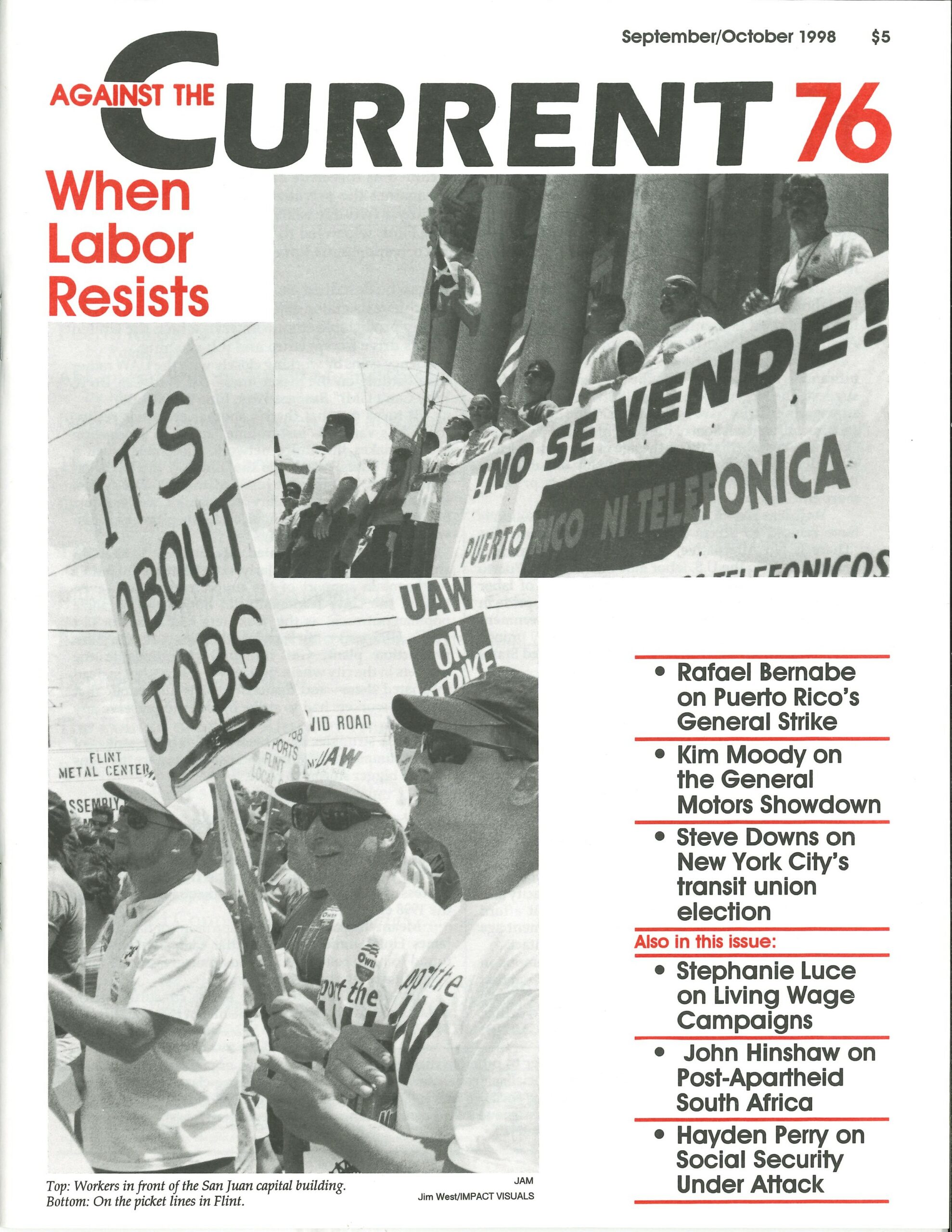Against the Current, No. 76, September/October 1998
-
The Signs of Resistance
— The Editors -
Never Be A Soldier
— Eugene Victor Debs (1915) -
Puerto Rico's La Huelga del Pueblo
— Rafael Bernabe -
At General Motors, "What Means This Strike?"
— Kim Moody -
New York Transit Between Old and New Directions
— Steve Downs -
Living Wage Campaigns: Part I
— Stephanie Luce -
Social Security--Why It's Under Attack
— Hayden Perry -
The Rebel Girl: Our Books, Ourselves
— Catherine Sameh -
Random Shots: Red Flags Over Motor City
— R.F. Kampfer -
Indonesia Update: An Economic Titanic
— Malik Miah -
Northern Ireland's Marching Season Crisis
— Stuart Ross -
The Danish General Strike
— Eric Chester -
The Politics of South Africa: The Transition to Democracy
— John Hinshaw - Reflections in Radical History
-
Red Ink: The Charles H. Kerr Story
— Tim Dayton -
Leslie Reagan's "When Abortion Was A Crime"
— Dianne Feeley -
Trotskyism: Wheat and Chaff
— Peter Drucker -
Marat: Champion of the Urban Poor
— Morris Slavin - Dialogue
-
On Marxism and Method
— Martin Glaberman -
Deeply Re-examining Marxism
— Cyril Smith -
On Criticizing Marx
— Ernest Haberkern -
A Response on "Critical Marxism"
— Michael Löwy -
Democratic Revolution and Socialist Revolution: A Reply to Malik Miah
— Steve Bloom -
Rejoinder: The Dynamics of Revolution
— Malik Miah
Catherine Sameh
WHEN WE OPENED the doors of In Other Words Women’s Books and Resources five years ago, we became part of the rich legacy of the women-in-print movement. For nearly thirty years feminist booksellers, authors and publishers have worked together to sustain, promote and disseminate the ideas and activism springing from feminist, queer and radical movements and culture.
Like all independent bookstores, feminist bookstores have struggled to survive in the age of the chain bookstores and corporate publisher mergers. As part of a national strategy to shut down established independent stores, the chains have invaded cities with thriving independents, stealing customer bases with clever marketing strategies and inflated budgets.
While many independents have maintained customer loyalty, an even greater number have had to close their doors. Feminist bookstores have been particularly vulnerable in the last few years as feminist and lesbian themes became coopted, mainstreamed and commodified.
Most chains now have a “women’s”and/or “gay and lesbian section,”and authors like Dorothy Allison, bell hooks, Susie Bright and Jane Hamilton can now be found almost anywhere. The superstores—primarily Borders and Barnes & Noble—also promote the skewed notion that they are providing greater access to feminist and queer authors, rescuing these voices from obscurity and the literary ghetto.
Many readers in progressive communities have bought this logic. But like corporate publishers, superstores are merely exploiting the committed, hard work of feminist publishers and bookstores. As booksellers in the business of social change, our mission from day one has been to promote feminist and queer books not as mass commodities from which to profit, but as intellectual and cultural tools of change.
A case in point: It was feminist booksellers who ordered, read, loved and promoted Dorothy Allison’s excellent book of short stories and essays, Trash,when she was first published by Firebrand, a small feminist and lesbian press. Without the work of Firebrand and feminist booksellers, Penguin USA (Allison’s current publisher) and their bedfellows, the superstores, would not be cashing on Allison’s success.
Unlike corporate publishers, Firebrand will continue to publish the work of many more writers living and working in the margins of U.S. life—working-class dykes, women of color, transgendered dykes and sex radicals—who may never enjoy Allison’s success. Feminist and other independent booksellers will order, and actually read and talk about, these authors who push our thoughts and lives in new and challenging ways.
The chains will never share the values of independent bookselling. Their only mission is to become the reading public’s only source for books, thereby increasing their bottom line.
Should this happen, feminist bookstores won’t be around to give the chains ideas about what to stock in quality feminist and queer literature. With no commitment to alternative ideas, and a commitment only to profit, the corporate bookstores and publishers will slowly “disappear”this literature from our lives.
This vicious cycle can only be broken when communities invest in independent—and in explicitly feminist, queer and radical—bookstores. Without that investment we can’t compete with the chains.
But with a long-term commitment from our communities we can preserve, promote and distribute the literature that changes, and sometimes even saves, lives —which is after all what we’re in the business to do.
ATC 76, September-October 1998

